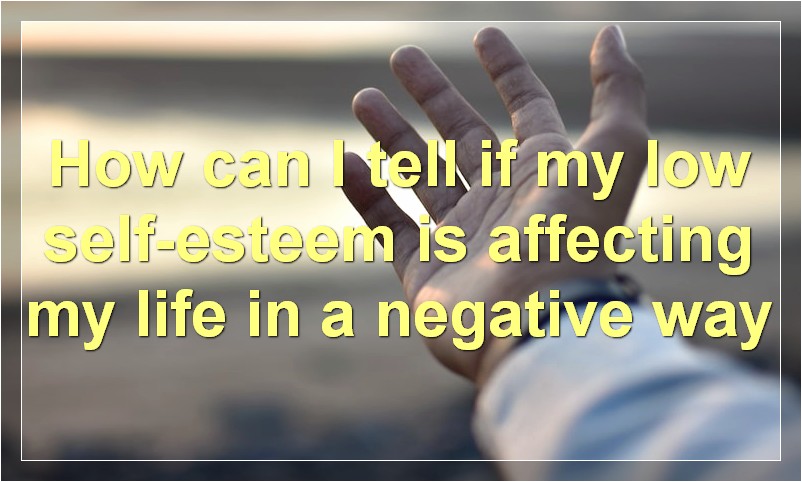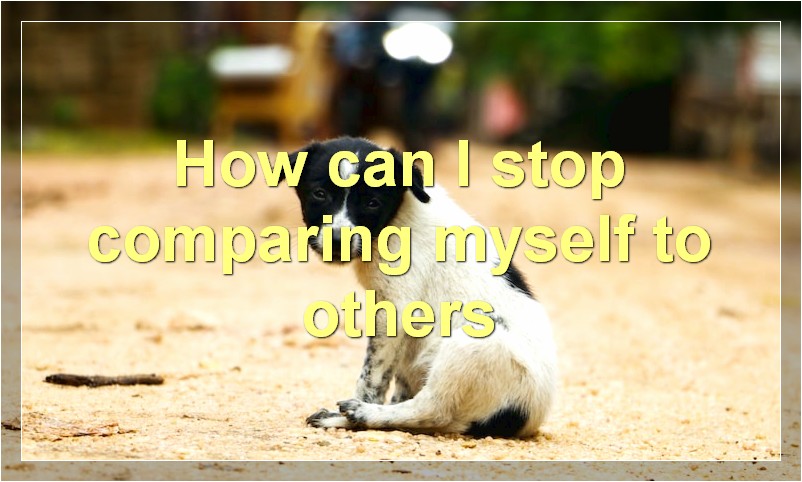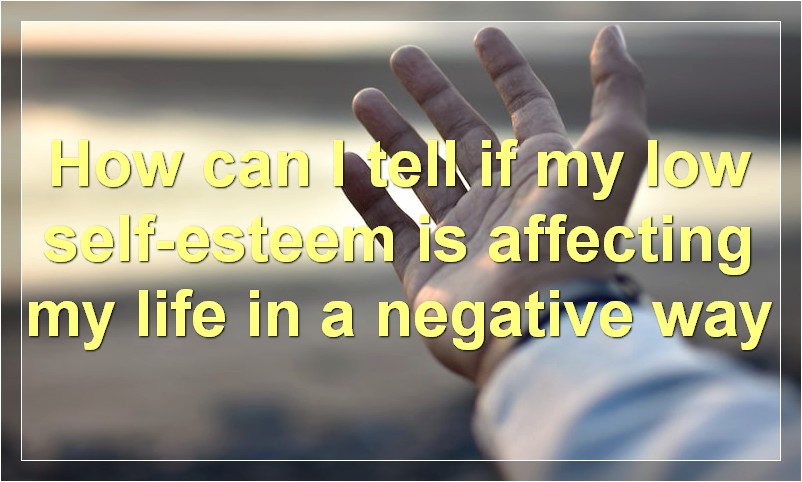If you’re asking yourself why you feel like you’re not as smart as you should be, you’re not alone. Many people feel like they’re not living up to their potential, but the good news is that there are things you can do to change it.
How can I tell if my low self-esteem is affecting my life in a negative way?

You might be surprised to learn that having low self-esteem can negatively affect many areas of your life. Here are some signs that your low self-esteem is causing problems:
1. You’re overly critical of yourself.
If you’re constantly berating yourself for your mistakes and faults, it’s a sign that your self-esteem is low. This negative self-talk can lead to feelings of worthlessness and inadequacy.
2. You compare yourself to others.
Constantly comparing yourself to others is a surefire way to feel bad about yourself. No one is perfect, and comparing yourself to others will only make you feel worse.
3. You avoid challenging situations.
Because you don’t feel confident in your abilities, you might avoid challenging situations. This can limit your growth and prevent you from reaching your full potential.
4. You’re a people pleaser.
If you’re always saying “yes” to others and putting their needs before your own, it’s a sign that you don’t value yourself enough. This can lead to resentment and burnout.
5. You have difficulty accepting compliments.
Do you brush off compliments or downplay your achievements? This is a common symptom of low self-esteem. It can prevent you from fully enjoying your successes.
6. You’re perfectionistic.
Perfectionism is another common symptom of low self-esteem. striving for perfection can actually make it harder to achieve your goals and can lead to feelings of failure when you make even the smallest mistake.
7. You’re struggling with anxiety or depression.
Low self-esteem is often accompanied by anxiety or depression. If you’re feeling persistently anxious or down, it’s important to seek professional help. Left untreated, these conditions can have a serious impact on your quality of life.
What are some things I can do to start improving my self-esteem?
It’s no secret that having strong self-esteem is linked to happiness and success in life. People with high self-esteem feel good about themselves and are more likely to lead happy, fulfilling lives.
If you’re not happy with your current level of self-esteem, don’t worry – there are plenty of things you can do to start improving it today. Here are 10 tips to get you started:
1. Accept compliments graciously
When someone pays you a compliment, don’t brush it off or downplay it – accept it graciously and let it boost your self-esteem.
2. Give yourself credit
It’s important to recognize your own accomplishments, even if they seem small. Give yourself credit for the things you do well and be proud of your achievements.
3. Be assertive
Don’t be afraid to speak up for yourself or to ask for what you want. Being assertive shows that you have confidence in yourself and your abilities.
4. Set realistic goals
Setting unrealistic goals is a recipe for disappointment and low self-esteem. Set realistic goals for yourself and strive to achieve them. As you accomplish more, your self-esteem will increase.
5. Take care of yourself physically
Taking care of yourself physically can also help boost your self-esteem. Eat healthy foods, exercise regularly, and get enough sleep. When you look and feel your best, it’s easier to feel good about yourself.
6. Avoid comparisons
Comparing yourself to others is a surefire way to feel bad about yourself. Everyone is unique and has their own strengths and weaknesses. Focus on being the best YOU that you can be, and don’t worry about anyone else.
7. Be positive
Having a positive outlook on life is another key to maintaining high self-esteem. Practice thinking positive thoughts about yourself and your abilities, and avoid putting yourself down unnecessarily.
8. Be mindful of your words
The words you use to talk to yourself can either help or hurt your self-esteem. Make an effort to use positive, encouraging language when you think or speak about yourself. For example, instead of saying “I’m such a klutz,” try saying “I’m learning new physical skills all the time.”
9. Seek out support
If you’re struggling with low self-esteem, seek out supportive people who will build you up instead of tearing you down. Friends, family members, teachers, coaches, or counselors can all be great sources of support.
How can I become more confident?
No one is born confident. It’s something that you have to learn and work on. But the good news is that confidence is a skill that can be learned. Here are some tips to help you become more confident:
1. Set yourself realistic goals
The first step to gaining confidence is setting yourself realistic goals. Trying to achieve something that’s out of your reach can only lead to disappointment and frustration. When you set your sights too high, you’re setting yourself up for failure. So start small and gradually work your way up.
2. Take baby steps
If you’re finding it hard to take the first step, then take baby steps instead. Remember, Rome wasn’t built in a day. Confidence is something that you have to build up over time. So don’t expect to see results overnight. Just focus on making progress, however small it may be.
3. Be prepared
One of the best ways to gain confidence is to be prepared. If you know what you’re doing, then you’ll feel more confident about it. So do your research and make sure you know what you’re talking about. This will give you the boost you need to feel more confident.
4. Fake it till you make it
If all else fails, then fake it till you make it. Act confident even if you don’t feel it. The more you do it, the more natural it will become. Soon enough, you’ll start feeling more confident without even realizing it.
5. surround yourself with positive people
Another great way to gain confidence is to surround yourself with positive people. These are the people who will believe in you and help you achieve your goals. They will provide emotional support and encouragement when you need it most. So find a group of friends or mentors who can help boost your confidence levels.
Why might I feel like I’m not good enough?
It’s perfectly normal to feel like you’re not good enough sometimes. We all have moments where we doubt ourselves and our abilities. However, if you find that you’re constantly feeling like you’re not good enough, it could be a sign of something more serious, like impostor syndrome.
Impostor syndrome is a psychological phenomenon where people feel like they’re frauds, even when they’re not. They’re afraid of being exposed as a fraud and often doubt their own accomplishments. If you think you might have impostor syndrome, it’s important to seek professional help. left untreated, impostor syndrome can lead to anxiety, depression, and other mental health issues.
If you’re feeling like you’re not good enough, try to remember your accomplishments and the things that make you unique. It’s also important to talk to someone you trust about how you’re feeling. Talking openly about your doubts and insecurities can help you start to work through them.
How can I stop comparing myself to others?

It’s no secret that social media has created a culture of comparison. We compare our relationships, our bodies, our careers, and just about everything else to the lives we see portrayed online. This constant comparison can lead to feelings of inadequacy, insecurity, and even depression. So how can we break free from the comparison trap?
1. Acknowledge that everyone has different strengths and weaknesses.
We all have different skills, talents, and abilities. It’s important to acknowledge your own strengths and weaknesses, and to focus on what you can do to improve your weaknesses. Trying to be like someone else is a losing battle, because you’ll always fall short. Embrace who you are and work on becoming the best version of yourself.
2. Be mindful of the stories you’re telling yourself.
The stories we tell ourselves can have a big impact on how we feel about ourselves. If you find yourself constantly comparing yourself to others, ask yourself if the story you’re telling yourself is accurate. Are you really as far behind as you think? Is that person really as perfect as they seem? Chances are, the answer is no. Be mindful of the stories you’re telling yourself, and question whether or not they’re true.
3. Focus on your own journey.
Comparison is only harmful if it leads to envy or jealousy. If you’re focused on your own journey and doing what’s best for you, then there’s no reason to compare yourself to others. Everyone’s path is different, so it’s important to stay focused on your own goals and not get sidetracked by what someone else is doing.
4. Remember that social media is not reality.
It’s easy to forget that social media isn’t reality. People only share the highlights of their life online, so it’s not an accurate portrayal of what their life is actually like. Don’t believe everything you see on social media, and don’t let it dictate how you feel about yourself.
5. Spend less time on social media.
If social media is causing you to compare yourself to others, then spend less time on it. Limit your time on social media, and make sure you’re using it in a way that benefits you. Follow people and pages that make you feel good about yourself, and unfollow anyone who doesn’t add value to your life.
6. Practice gratitude.
One of the best ways to stop comparing yourself to others is to practice gratitude. When you’re feeling down about yourself, take a moment to think about all the things you’re grateful for in your life. This will help shift your focus from what you don’t have to what you do have, and it will remind you of all the reasons why you should love yourself just the way you are.
How can I learn to love myself?
It’s a common question we ask ourselves: how can I learn to love myself? The answer is simpler than we think. We often make the mistake of thinking that we need to achieve something or be someone different in order to start loving ourselves. This couldn’t be further from the truth. Learning to love yourself is an inside job. It starts with accepting yourself for who you are, right here and now.
That means giving yourself permission to be imperfect. It means allowing yourself to be human. It means giving yourself grace when you make mistakes. It means being gentle with yourself when you’re going through a tough time. It means being your own best friend and cheering yourself on, even when no one else is.
Learning to love yourself also means taking care of yourself – physically, mentally, and emotionally. That means eating healthy foods, getting enough sleep, and making time for things that make you happy. It might also mean seeking out professional help if you’re dealing with something difficult, like depression or anxiety.
The bottom line is that learning to love yourself is a journey. It’s not something that happens overnight. But it’s worth it, because when you learn to love yourself, you open up the door to a whole world of happiness, confidence, and self-acceptance.
How do I deal with negative thoughts about myself?
It’s no secret that we live in a society that is obsessed with perfection. Everywhere we look, we are bombarded with images of what we “should” look like, how we “should” act, and what we “should” be doing with our lives. It’s no wonder that so many of us struggle with negative thoughts about ourselves on a daily basis.
The good news is that you don’t have to let these negative thoughts control your life. There are plenty of things you can do to deal with them in a healthy and productive way.
Here are four tips for dealing with negative thoughts about yourself:
1. Acknowledge the thought, but don’t dwell on it.
When you have a negative thought about yourself, it’s important to acknowledge it. Don’t try to push it away or ignore it. That will only make it stronger.
Instead, simply acknowledge the thought and then let it go. Don’t dwell on it or give it any more attention than it deserves.
2. Reframe the thought in a more positive light.
Once you’ve acknowledged the negative thought, take a step back and try to reframe it in a more positive light. For example, if you’re thinking “I’m such a loser,” try to reframe it as “I’m doing my best and that’s all that matters.”
3. Challenge the thought with evidence.
Another helpful tip is to challenge the negative thought with evidence. If you’re thinking “I’m not good enough,” ask yourself what evidence you have to support that claim. Chances are, you’ll find that there is very little (if any) evidence to back up the negative thought.
4. Focus on the positive.
Finally, make a conscious effort to focus on the positive aspects of your life. When you catch yourself thinking negatively about yourself, counterbalance those thoughts by thinking of three things that you’re grateful for or three things that went well today.
How can I build up my self-respect?
It is said that self-respect is the cornerstone of all other virtues. Pope John Paul II once said, “Self-respect is the basis of human rights.” So how can we build up our self-respect?
There are many ways to build up self-respect. One way is to be true to yourself. Be honest with yourself about your strengths and weaknesses. Don’t try to be someone you’re not. Be authentic.
Another way to build up self-respect is to do things that make you feel good about yourself. This could include things like volunteering, taking care of your appearance, or excelling in your studies or career. It’s important to find activities that make you feel good about yourself, so that you have a positive foundation to build self-respect upon.
A third way to build up self-respect is by setting boundaries. Boundaries are necessary in order to protect ourselves from being taken advantage of or hurt by others. By setting clear boundaries, we show others that we respect ourselves and expect them to do the same.
Ultimately, the best way to build up self-respect is by living a life that is authentic and true to yourself. Find activities that make you feel good about yourself, and set boundaries in order to protect yourself from harm. By doing these things, you will develop a strong sense of self-respect that will serve as the foundation for all other virtues.
What are some small steps I can take to improve my self-esteem?
1. Get to know yourself
The first step to improving your self-esteem is getting to know yourself. This may seem like a no-brainer, but you’d be surprised how many people go through life without really taking the time to get to know who they are. Take some time for introspection and ask yourself what your values and priorities are. Once you have a good understanding of what makes you tick, you’ll be in a better position to start making changes that will improve your self-esteem.
2. Set realistic goals
One of the quickest ways to plummeting self-esteem is setting unrealistic goals for yourself. If you’re constantly falling short of your own expectations, it’s only natural that your self-esteem will suffer as a result. To avoid this trap, make sure that the goals you set for yourself are ones that you can actually achieve. It may take some trial and error to find the right balance, but it’s worth it in the long run.
3. Be mindful of your thoughts
Your thoughts play a huge role in determining how you feel about yourself, so it’s important to be mindful of the things you’re thinking. If you find yourself constantly putting yourself down or dwelling on negative experiences from your past, it’s time to make a change. Start making an effort to focus on the positive things in your life andChallenge your negative thoughts when they pop into your head. It takes practice, but eventually, you’ll start to see a difference in how you feel about yourself.
4. Take care of yourself
When was the last time you did something nice for yourself? If you can’t remember, it might be time to start making some changes. Taking care of yourself is crucial for maintaining healthy self-esteem. Make sure you’re getting enough sleep, eating healthy foods, and exercising regularly. It’s also important to find ways to relax and de-stress. Taking care of yourself may seem like a lot of work, but it’s worth it when you see the difference it makes in how you feel about yourself.
5. Surround yourself with positive people
The people you surround yourself with can have a big impact on your self-esteem. If you’re constantly around people who are critical or negative, it’s only natural that your own self-esteem will suffer as a result. On the other hand, being around positive people who make you feel good about yourself can do wonders for your self-esteem. So if you want to feel better about yourself, make an effort to spend more time with people who will build you up instead of tear you down.




